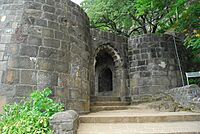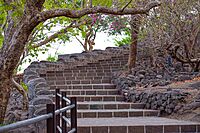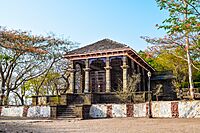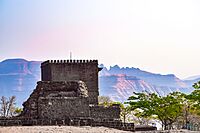Shivneri Fort facts for kids
Quick facts for kids Shivneri fort |
|
|---|---|
| Junnar, Pune District, Maharashtra | |
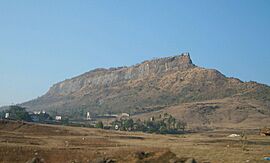 |
|
| Coordinates | 19°11′56″N 73°51′34″E / 19.1990°N 73.8595°E |
| Type | Fort |
| Site information | |
| Owner | |
| Controlled by | Yadava dynasty Bahmani Sultanate |
| Open to the public |
Yes |
Shivneri Fort, also known as Killa, is a very old and important hill fort in Maharashtra, India. It is located near the town of Junnar in the Pune district. This fort is famous because it is the birthplace of Chatrapati Shivaji Maharaj. He was the great leader who founded the Maratha Empire.
A Look Back in Time
Shivneri Fort got its name from the Yadava dynasty of Devagiri, who once controlled it. This fort was very important for protecting an old trading route. This route connected the region of Desh to the port city of Kalyan.
Over the years, control of the fort changed hands many times. In the 15th century, it came under the Bahmani Sultanate. Later, in the 16th century, it was taken over by the Ahmadnagar Sultanate.
In 1595, a Maratha chief named Maloji Bhosale was honored by the Ahmadnagar Sultan, Bahadur Nizam Shah. Maloji Bhosale was the grandfather of Shivaji Maharaj. The Sultan gave him control of Shivneri and Chakan forts.
Shivaji Maharaj was born at Shivneri Fort on February 19, 1630. Some records suggest he was born in 1627. He spent his early childhood years growing up within the fort's walls. Inside the fort, there is a small temple dedicated to a goddess named Shivai Devi. Shivaji was named after her.
An English traveler named Fraze visited the fort in 1673. He wrote that the fort was very strong and could not be easily defeated. He also noted that the fort had enough supplies to feed a thousand families for seven years! Shivneri Fort eventually came under British rule in 1819, after the Third Anglo-Maratha War.
In 2021, Shivneri Fort was added to a special list. This list is called the tentative list of the UNESCO World Heritage Committee. It is part of a larger group of forts called "Maratha Military Architecture in Maharashtra." This means it might become a UNESCO World Heritage Site in the future.
What the Fort Looks Like
Shivneri Fort is a hill fort shaped like a triangle. You can enter it from the southwest side of the hill through the main gate. There is also another way to enter, called the chain gate. To use this gate, you have to hold onto chains to climb up to the fort.
The fort stretches for about 1 kilometer (1 mile). It has seven winding gates that are very well protected. All around the fort, there are strong mud walls.
Inside the fort, you can find several important buildings. These include a prayer hall, a tomb, and a mosque. Mana Daravaja is one of the many gates that protect this fort.
At the very center of the fort, there is a water pond called 'Badami Talav'. To the south of this pond, you can see statues of Jijabai and a young Shivaji. The fort also has two natural water springs, named Ganga and Yamuna. These springs provide water all year round.
About 2 kilometers away from Shivneri Fort, there are ancient Buddhist rock-cut caves. These are known as Lenyadri caves. Lenyadri is also one of the Ashtavinayak temples in Maharashtra, which are special temples dedicated to Lord Ganesha. The Lenyadri caves have been declared a protected monument.
How to Visit
The closest town to Shivneri Fort is Junnar. Junnar is a taluka place, which means it's an administrative center. It is well connected by roads. Junnar is about 90 kilometers (56 miles) away from Pune.
The fort is only about 2 to 3 kilometers from Junnar town. It is quite easy to reach the top of the fort using the main entrance. However, if you are an experienced trekker and have proper climbing gear, you can try the chain route. This route is located on the western side of the fort.
From the top of Shivneri Fort, you can see several other forts in the distance. These include Narayangad, Hadsar, Chavand, and Nimgiri forts.
Images for kids
See also
- List of forts in Maharashtra
 | Jessica Watkins |
 | Robert Henry Lawrence Jr. |
 | Mae Jemison |
 | Sian Proctor |
 | Guion Bluford |


